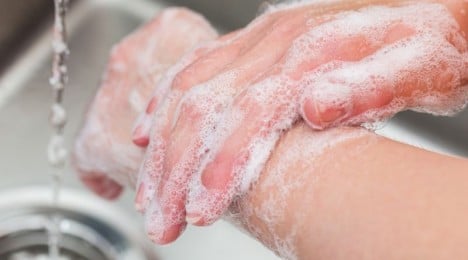Regular hand washing is an essential hygiene practice that can protect you from influenza, common viruses and many other viral and bacterial infections. Germs and viruses can spread from one person to another or from surfaces when a person touches their eyes, nose or mouth with unwashed hands. You can also pass a virus to another person if you prepare food or drinks with unwashed hands.
Other ways that cause the spread of respiratory infections is through touching contaminated surfaces and then touching your face or sneezing/coughing in your hands then touching other objects or other people. To prevent all these unwanted incidents, it is best to always keep a proper hand hygiene routine through washing your hands frequently with soap and water. Here’s an easy guide on how to wash your hands regularly without worrying about dry skin!
How to wash your hands in 6 easy steps
Respiratory viruses can spread when mucus or droplets containing the virus get into your body through your mouth, eyes or nose. Unclean hands are one of the most common ways of spreading viruses. So, how to wash your hands properly to prevent falling ill or spreading an infection to others if you catch it? Here’s an easy 5-step process to washing your hands properly according to the CDC:
STEP 1: Wash
Start by wetting your hands with warm or cold running water. The water temperature does not seem to affect germ removal.
STEP 2: Lather
Apply enough antibacterial hand wash product or soap to cover your wet hands. The friction from lathering and scrubbing hands helps lift microbes and dirt from the skin.
STEP 3: Scrub
Scrub your hands properly and don’t forget to rub between your fingers and under your nails. According to WHO, washing your hands should take 20 seconds - about as long as singing or humming “Happy Birthday” twice!
STEP 4: Rinse
Rinse your hands thoroughly with running water.
STEP 5: Dry
Dry your hands using a clean towel or a single-use tissue. Wet hands are more susceptible to germs and bacteria, so make sure you dry your hands.
STEP 6: Moisturise
Washing your hands often can cause the skin to dry out and cause irritations, use a daily moisturiser to keep your skin soft and supple.
When should I wash my hands?
To avoid seasonal viruses and respiratory infections, you should wash your hands regularly. These following instances are some that necessitate hand washing:
When you blow your nose, sneeze or cough.
Before and after eating or preparing food.
Before and after caring for a sick person.
After visiting public places like markets and public transportations.
After touching any surfaces outside your home.
After carrying garbage.
After touching pets or animals.
After using the toilet.
Tips to keep your hands moisturized and germ-free
Frequent hand wash and sanitizer use can cause dry hands. However, there are antibacterial products that are designed gently to help care for your hand while keeping them clean. Johnson’s experts designed antibacterial products aimed at killing germs effectively with powerful germ removal technology while keeping your hands moisturized and smooth. The collection provides hand washes, and body washes formulated to infuse your skin with moisture while effectively eliminating germs and bacteria.
Besides choosing the right handwash product, here are more tips on how to avoid dry skin:
Use lukewarm water and avoid hot water which is more likely to dry your hands and strip them of any natural oils.
Use topical moisturizers to restore the barrier function of the epidermis and provide a protective film to your skin. Try Johnson’s® 24-Hour Moisture Hand Cream to relieve tightness, roughness and dull-looking skin. You can also use Johnson’s 24-hour Moisture Body Cream, this soft cream guarantees 24-hour hydration to prevent dryness on both your face and body.
To avoid micro-abrasions on the skin, don’t wipe your hands when drying them. It’s best to use paper towels and gently pat or plot your hands dry.
Is it better to wash your hands or use hand sanitizer?
Both handwashing with soap and water and using hand sanitizers are efficient at eliminating most pathogens and germs. While hand sanitizer is often more convenient, it does not kill all kinds of viruses and bacteria. And if your hands are visibly unclean, hand sanitizers might not be very useful. They also don’t remove harmful chemicals from your hands. However, an effective hand sanitizer should contain at least 60% alcohol.

